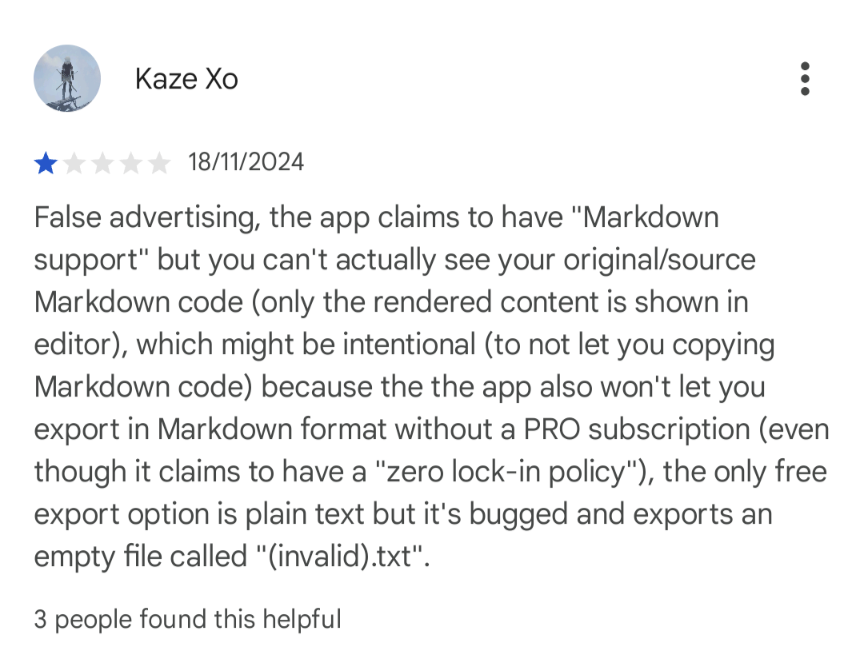Read whole page. Not sure what Obsidian even is?
It’s like trillium, but not open source Here is an enthusiastic person talking about the state of the art of one year ago for 20 minute. https://youtu.be/XRpHIa-2XCE
What is a Trillium?
It’s like a Bilium, but with one more
deleted by creator
It’s like Millium, but one more.
Note-taking app. Each note is a markdown file, so you can add formatting.
A very successful one with a large extension ecosystem to boot.
What sort of extensions would one use for a note taking app? What sort of notes to you take with it?
I use mermaid and git extensions personally.
Lots of AI bros add LLMs to it but that’s not my cup of tea
The Dataview plugin is the most critical one. You can create queries with the metadata in your notes (YAML frontmatter and # hashtags). If that sounded like a bunch of non-sense I highly encourage you to dig into it, because I had no idea what those words meant either but it took my note taking to a new level. I think of my Obsidian vault as my second brain.
Below are some cool examples of vaults that you can click through. Also note that because the obsidian pages are in markdown format you can use the Jekyll engine to directly turn them into web pages without any coding (this is how GitHub Pages works)
If you know how to do a bit of coding (or use ChatGPT) you can incorporate APIs from other apps in your obsidian vault. Maybe you want to make a fancy home page that displays all your tasks from ToDoist, alongside the RSS feeds to your favorite podcasts and YouTube channels. Maybe you are tracking your habits and using DataView to compile all relevant instances of #habit tags into one calendar for a birds eye view.
There’s lots of types, think even stuff like d&d monster blocks, or custom date ones
Its a staggeringly powerful app. Utilizing the markdown format and the Dataview plugin to create queries with metadata in your notes allows you to build INSANE knowledge management systems.
Example of some set ups here: https://forum.obsidian.md/t/14-example-vaults-from-around-the-web-kepano-nick-milo-the-sweet-setup-and-more/81788
I couldn’t get work to pay for it so I found a better, cheaper alternative, Notesnook. It’s open source (client and sync server), you can publish notes, and it’s end-to-end encrypted.
i use notally for quick notes and reminders but i needed another organizer for longer text
i started trying notesnook after reading your comment and it looks like what i needed. I really like its customizability. I wish there was an option to choose fonts from file.
The only problem is that constant login reminder. Is there a way to get rid of it?
Thanks for sharing I didn’t know about this one and it’s robust as keep
I just wanted to toss out another thanks for mentioning Notesnook. After a week I’m completely won over.
The community plugin “Google Drive Sync” is free, open source, and lets you (clunkily but effectively) bypass Obsydian Sync. One less server to manage.
Which is a great workaround but then all your private notes are on Google’s servers, accessible to anyone with enough admin rights on their end. All apps should be end-to-end encrypted going into 2025. There’s no reason security AND privacy shouldn’t be included.
There’s also syncthing, which allows syncing a folder… Hell theres even a git plugin to bypass obsidian sync, so you can get version controlled notes (which might be desirable in a work setting)
Wdym by bypass obsidian Sync? Do you have the link for said plug-in?
There is also the Obsidian Selfhosted Livesync community plugin that will sync with your own sync server. As the name suggests, it syncs live, so you can even see typing from one device appear on another. It’s pretty neat
Huh, didn’t see that one when I set up obsidian… I might check it out because syncthing does have some conflicting edit issues from time to time
Can you selfhost a sync server? Be completely independent of them?
technically yes. they just recently made the sync server open source - https://github.com/streetwriters/notesnook-sync-server - but their documentation for it is still pending.
I’ve been following their progress for a while and can say that they appear to be following through on all their goals. and are very responsive to issues on GitHub. but don’t take my word for it, check out their roadmap to see when they release the self hosting documentation- https://notesnook.com/roadmap/
It says it’s free, but then there’s a pricing and plans page?

A lot of alarm bells ringing for me about that app.
Notesnook is free. It is developed under gpl https://github.com/streetwriters/notesnook
It’s always been free for me using Mobius Sync…
SyncThing for me, but yeah.
Yup! I should have been more specific, Mobius Sync uses syncthing on iOS.
Not the point here. Using it in a commercial environment for free was a violation of the terms, now it’s not anymore.
Ah got it, thanks for the clarification.
deleted by creator
It’s a very, very different approach having everything as a bullet point though.
This is true of Markdown though, no? Which Obsidian runs?
Markdown has many more elements than bullet points
deleted by creator
I think for some brains it just doesn’t click. How do you write a long form document? How would you write documentation? How would you write a blog post?
I tried for a while but I just couldn’t understand the concept of “Everything as an outline.”
deleted by creator
Thank you, that’s what I had suspected, so I’m glad I wasn’t doing anything wrong.
The way I like to think is through long form writing and personal documentation, so I guess it’s not a good match for me.
In Obsidian I have a script that lets me know any notes that aren’t linked to anything else, so it means I have everything interlinked.
I’ve tried logseq for the last 6 months (no commercial license) at work, but while it’s really good for outlining, it’s lack of a tag function is what feels like a critical weakness to me. I realize structurally it’s different in concept. But making everything into bullets doesn’t always suit the task.
I would love Logseq for journalling or writing though.
Obsidian dev’s original project Dynalist is an outline based notes app that does have tags. She doesn’t update it anymore but I still rely heavily on it as my second brain.
deleted by creator
Yes, but the syntax and documentation on the queries is obtuse as hell in logseq. Like it is ridiculous how granular you have a to get of you want to return all links within a time period or something. If I need to write SQL to pull notes, I should just use a database, lol.
The nice thing about tags as a distinct entity is it offers the option you can utilize if you choose. It gives you two buckets you can sort into and connect between. And it does make creating “topic groups” easier than manually linking them all to a tag page in logseq, imo.
Conversely, I would massively prefer of Logseq abolished support for hashtags entirely if they are functionally identical to wikilinks. Or combine them so the hashtags auto-convert to wikilinks or vice versa. But supporting hashtags in any manner when they are frankly not a “real” feature is more frustrating. Making topic links in Logseq is harder because of this.
Also, the existence of tag pages themselves is a confusong abberation given the above…
Logseq is a great tool, but very different in terms of what it is best suited to handle. I think I will revisit it for if I do a lot of writing, but for disparate ideas or notation it is good but could be better.
It doesn’t matter if it’s a “far more organised approach”, logseq simply doesn’t fit many types of workflows for note taking.
logseq is a zettelkasten program; Obsidian is a text editor
deleted by creator
I thought this was about a different obsidian lol
Same. I’ve never heard of the Obsidian in the OP, so I was hoping they somehow left Microsoft and were looking for a game designer or something.
This is the same conversation they had with reddit for years. It’s being developed for everyone and we’ll make it open some day. Now look what happened.
I use obsidian but only with the bare minimum knowing that I may have to jump ship at any moment.
It’s regrettable that Obsidian isn’t open source. But the nice thing about it is that its data store is just a bunch of markdown files in a folder structure, and very easily migrated to any other application. They may have the code but they don’t take the data hostage like a lot of commercial software does.
Agreed, I use it with as few options and extensions as possible. I don’t want to start creating a complex system of notes that will rely on anything specific. I try to stick to the core functions without any extras because of the worry of eventually falling into a proprietary black hole. I keep my foot in just enough to get my uses but not so much that I might get stuck with the software.
Yeah they even say if you don’t like what they do in the future you can easily pickup your md files and take them elsewhere.
deleted by creator
I was using Obsidian for a while, but actually switched when I found an awesome open source alternative, SilverBullet. The best comparison would be “Obsidian but for tinkerers/hackers”.
Data is stored plaintext the same as obsidian - I actually just copy pasted my vault and it worked with exception of wikilinks being absolute paths only - and haven’t looked back
The only downside is that its in early stages of development, but definitely usable
I like Silverbullet, but I could never get the file tree to work well. Any tips? Or is that not a feature you use?
I have an “index” page where I link important pages and files. When I want to move them I rename them. If I do bulk data changes I SSH to my server and move the files in an old fashioned way. Personally I have not tried the filetree plugin, since I did not have the need for it - and probably the author of the project aswell.
I jumped over to logseq. It takes some getting used to, but overall logseq is working fine overall.
I assume this means free for local use? Not any kind of backups?
Why would they donate server space to you on top of giving you free (beer) software?
The way some of you think is very odd to me.
Back up your own shit or pay for sync.
I said absolutely nothing to indicate that I felt that way so I don’t know WTF you’re on about.
I assume this means free for local use? Not any kind of backups?
Why would they donate server space to you on top of giving you free (beer) software?
That’s literally what you said… ?? Or at least that’s how it reads to me and the previous commenter.
That literally doesn’t even remotely resemble what I said.
I don’t necessarily like a few takes in the comments here.
Vibes wise the Obsidian team seems to be great and they don’t seem to have shown any reason why I should distrust them. I love FOSS but gifting others my work doesn’t put food on my table, so in that sense they need to have a lucrative business model which they seem to have established.
I could use SyncThing, Git or other solutions to do synchronisation between my devices but I choose to buy their Sync offer, since I want to support them (they also have EU servers, which need to be GDPR compliant by law afaik).
The closest comparison I could make is NextCloud. NextCloud open sources their software, but they sell convenience. Sure, you could self host it, but paying them to do so for you may be more attractive. In comparison Obsidian is not really complicated to set up or maintain. It’s literally just a MD-editor. So the only convenient thing to sell is synchronisation if you don’t want to put a price tag on the software.
If they open source all their code, some tech wizard will implement a self hosted obsidian sync server with the same convenience as theirs in a day, and the company will lose their revenue stream.
We’ve all been burned by tech bros in one way or another, but I think it’s ok for people to profit off of their IP. And they seem to be doing so with a positive vision. Feel free to let me eat my words if they ever go rogue, but that’s my 2 cents.
One thing that keeps me really calm about obsidian is the plaintext database. I can live with a proprietary db if the code is foss and I can fudge my data out if I need to. If code and db are proprietary, I’m not putting my data there if I can help it.
Thanks for the rare, rational comment regarding Obsidian. Many people here seem to think releasing software as closed source automatically means you have something to hide; seemingly forgetting we live in a capitalist system in which you must constantly sell your services to survive. (I am saying this as someone who adores FOSS and donates to most of my homelab software on a regular basis).
I think a more productive way to look at is: is the closed source dev friendly (or at least non-hostile) to the open source community? In the case of Obsidian, they haven’t done anything egregious, and regularly contribute to open source plugins. Furthermore, the notes are stored as markdown files. This gives the user strong resistance against potential enshittification, so even if they did go rogue you can just move to some other text editor lol. Granted, you would miss out on plugins but otherwise that’s a good reason to keep your plugin usage light and plan your Obsidian vault accordingly.
If they open source all their code, some tech wizard will implement a self hosted obsidian sync server with the same convenience as theirs in a day, and the company will lose their revenue stream
Obsidian is storing everything as plaintext files. Those convenient selfhosted sync solutions have been out there for years.
It’s not just about syncing files. It’s also the fact I can edit stuff on my tablet and see the changes in almost real time on my laptop with Obsidian Sync. I believe most other solutions wouldn’t play nice with such a workflow.
With the vault stored on a synchronized cloud drive, Proton/Google/etc the same thing happens.
Then that’s a moot point I guess, haha.
Still a great way to pay for Obsidian to support the development though.
Yeah I agree, hopefully it’s a rare non-evil entity that just wants to make a revenue off convenience and quality rather than some batshit shareholder nightmare monetization garbage.
I use this as a backup in tandem with the official sync
And the official one works every time, remotely-save just fails randomly and I need to dig through the logs to see what happened this time
it’s ok for people to profit off of their IP
Absolutely. I just have trust issues with closed source software and platforms. Burned too many times.
Joplin is more directly comparable. The apps are open source and it offers sync with all kinds of targets. It monetises through a source available sync server (i.e you can run your own but you arent allowed to run it commercially) hosted by Joplin (Joplin Cloud)
For transparency im directly involved with Joplin as a volunteer (less so in recent months admittedly) so yeah, im a bit biased.
I think it’s ok for people to profit off of their IP
I absolutely agree. That doesn’t mean the software has to be closed source though, a lot of software works well when sold with paid support, especially to companies.
If the price is low enough, companies will often just pay even if they don’t need the support.
That’s a bit naive imho. Remaining closed source is a form of IP protection and that’s really ok for what Obsidian is (a markdown editor). There’s just not any benefit for them other than appreciation from FOSS enthusiasts. Also maintaining an open source repository causes a higher workload and they lose a lot of freedom.
If privacy is your concern you don’t need source code anyway. It’s quite easy to sandbox an application like that and analyse network traffic and such. Also Obsidian is built using Electron. That means with enough motivation one could quite easily reverse engineer most of the app. Most of the applications behaviour can also be observed via the integrated dev console, which lets you view source code.
In short I don’t really see the need, unless I want to build or maintain it myself. And I think the negatives far outweigh the positives from the perspective of Obsidians team.
You don’t need a public repo to be FOSS. You don’t need to accept changes. All you need is to provide a copy of the source code upon request. You can even automate that with a link to a tarball or something in the app.
My concern is less about privacy and more about security and longevity (i.e. what happens if they turn evil?). If it’s FOSS, I can audit the source and fork it if they go in a direction I don’t like. If it’s proprietary, I’m SOL if they turn evil or stop development. Projects like these tend to die.
I don’t really see any negatives here. The chance that someone makes a more popular fork is incredibly low, and the chance that someone audits it and points out a bug is a lot higher. They can retain control of the name, sell the software, etc. I really don’t see how providing source code is a downside.
I guess we just have to agree to disagree then. Which is fine.
Your points are valid and thank you for detailing them for me. If I was in their shoes making others able to steal my IP, even if they’re not allowed due to licensing and having to deal with constant scrutiny of the source code are k.o.-criteria, which hinder the project and lead to potential revenue loss.
And it’s totally fair to run your project however you choose. My point is just that FOSS doesn’t automatically mean you can’t make money, tons of businesses are built on a FOSS-first basis. Pick the model that works for your business, and I sincerely hope you find a way to make FOSS part of it.
As I’ve said. Nextcloud is a great example of FOSS working out for a business, haha.
Excellent news ! Excellent note taking applications with its ecosystem of extensions.
Switched from Onenote to obsidian. There was a small learning curve and I had to install some plugins, but I love it. It looks amazing and runs so much faster than OneNote ever did.
So does obsidian support nonlinear spatially organised notes the way onenote does? I’ve been using joplin but without that onenote feature it’s been a bit underwhelming tbh, and I can’t find any software that does it.
You mean like the obsidian canvas?
That’s the thing, thank you! I tried looking before and couldn’t find anybody doing it. Maybe I discounted obsidian because it wasn’t free or foss. If it’s free now and the format is open then that helps a lot.
I would love to move off OneNote but the lack of alternatives that support inking is disappointing.
Obsidian has a plug in for this… here is an announcement from the plugin author: https://www.reddit.com/r/ObsidianMD/comments/1bsa6dy/alpha_release_of_my_handwriting_plugin_ink/ (sorry for a reddit link)
For sure. I’ve been looking for a solid OneNote replacement for a few years now. Inking is the only major barrier.
I really like OneNote, and I’ve been using it for more than 10 years. But in recent years, my dislike for Microsoft has grown to the point where I feel I need to stop using all their products.
Right now I’m using xournal++ a lot. It has really excellent drawing functionality; but zero organisational functions. (I’m organising my xournal notes using just file names and folder structure.)
What I really want is integrated xournal support with Obsidian, or Joplin. In Joplin, I’ve tried inserting a pdf into my notes, and telling Joplin to open the pdf by launching xournal++. That sort of works; but the viewing of the pdf in Joplin shows a window-within-a-window; and the creating of new notes is fiddly; so I decided it wasn’t quite good enough.
Note linking is what did it for me a few years back. It’s possible in OneNote, and clunky as hell.
I was sold the moment I read links can be wiki style in Obsidian.
I moved from Google keep notes to obsidian.
As for the onenote its useful for its hand written notes.
Yea i know obsidian has it but i have so many old notes there. But I’m making new notes in obsidian itself
Was there a way to import your Google Keep notes into obsidian?
First use “importer” community plugin to import the zip file of Google keep (search Google for how to get that keep zip file backup)
Then use "consistent attachment and link " plugin to transfer images in sub folder accordingly.
Finished.
Dynalist is where it’s at.
The android app want to quit when you hit the back button and it drives my nuts
Excellent news for myself. I’ve wanted to use this at work but it’s hard enough to convince people to use it without asking for money.
I wanted to go all in on Obsidian, but in the end I went with “Upnote” which has an easy UI and a lifetime price. (No monthly fees). It’s like a mix of Evernote and OneNote. The Slash commands are so cool too.
It’s a different thing. What Obsidian and Logseq offer is plain-text markdown files in folders on your disk. Upnote and most of the other alternatives mentioned in this post store their data in a database.
Different thing altogether. Just depends what you’re looking for.






















